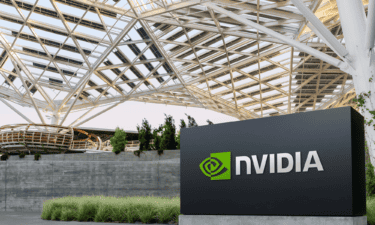High-flying tech stock Marvell Technology Group (NASDAQ: MRVL) has been brought back down a bit. The chipmaker looked all set to take advantage of the rollout of fifth-generation (5G) wireless networks thanks to its design wins in this nascent space, but U.S. restrictions on doing business with Huawei have scuppered the company’s progress.
Marvell recently released its second-quarter results and the numbers were not something that investors would have liked to see. Sales fell slightly from the prior-year period and adjusted net income tumbled by a third. What’s more, the chipmaker’s guidance indicates that it is in the midst of a slowdown.
Marvell’s guidance leaves a lot to be desired
Marvell forecasts third-quarter revenue of $660 million at the midpoint of its guidance range, which is significantly lower than the $851 million in revenue it generated in the year-ago quarter, though investors shouldn’t forget that the company sold its Wi-Fi business earlier this year to NXP Semiconductors.
That business generated $300 million in annual revenue for Marvell in the previous fiscal year. As the guidance doesn’t include revenue from this segment, the chipmaker’s third-quarter revenue would be affected to some extent assuming a quarterly revenue run rate of $75 million.
However, Marvell’s third-quarter guidance does include revenue from its acquisition of Cavium that was completed in July last year.
The company blames the U.S. government’s ban on doing business with Huawei for its troubles. The company accounts for a mid-single-digit percentage of Marvell’s total revenue. The chipmaker had already warned investors that the addition of Huawei to the so-called Entity List would have a negative effect on its business.
However, Huawei isn’t the only factor that’s pulling Marvell back. According to Summit Insights Group analyst Kinngai Chan (as reported by Reuters) Cisco (NASDAQ: CSCO) carried greater responsibility for Marvell’s weak showing last quarter.
Chan estimated that the networking giant in some quarters accounts for up to 11% of Marvell’s total sales. Cisco’s sales in China were down by 25% last quarter because of the trade war as Chinese customers are reportedly shunning Cisco products in favor of local players. Cisco CEO Chuck Robbins says that the company isn’t “being allowed to even participate” in that market anymore.
This is bad news for Marvell because Huawei and Cisco were supposed to be two vital cogs in China’s 5G rollout.
Is the 5G opportunity going to be delayed?
Now that Cisco is being frozen out by Chinese carriers, its chances of benefiting from the massive 5G investments that China has lined up seem to be bleak. And the chances of Marvell’s resuming shipments to Huawei remain shrouded in uncertainty. The Trump administration has reportedly received 130 requests for licenses from U.S. companies to resume shipments to Huawei, but none of them have been granted, according to anonymous sources cited by Reuters.
The desperation of U.S.-based chipmakers to resume business with Huawei isn’t surprising as the Chinese networking giant is sitting on half of the 5G contracts issued by China Mobile, the world’s largest telco based on the number of subscribers.
So Marvell’s catalyst could take time to arrive thanks to the U.S.-China trade war and a potential slowdown in spending on telecom hardware that has the potential to delay the transition to 5G. CEO Matt Murphy was probably indicating the same on the latest earnings conference call when he said:
First, in our networking business, revenue during the quarter was $330 million, down 3% sequentially with seasonal growth in Wi-Fi products more than offset by the US government’s export restrictions on Huawei and a pause in demand from our base station OEMs, as they transition from 4G to 5G.
However, Marvell remains confident that 5G is a long-term play and that the company could eventually generate $600 million in annual revenue from this market. That would be a big catalyst for the company given its trailing-12-month revenue stands at $2.9 billion. But investors shouldn’t forget that getting there might take time.








